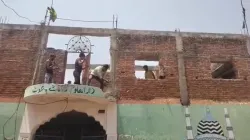In a move that has triggered unease and raised questions about selective enforcement, an old madrasa situated in BD Colony of Panna district, Madhya Pradesh, was demolished on the grounds of alleged encroachment on government land, reported the Patrika News. The demolition is reportedly one of the first such actions carried out under the provisions of the amended Waqf Act.
According to local sources, the madrasa had been operating for several years, offering religious education to underprivileged children in the area. Despite objections and complaints from a section of the public, no conclusive verification or inclusive community dialogue was conducted before the sudden demolition. The action followed a complaint submitted to BJP’s Madhya Pradesh President Vishnu Dutt Sharma, alleging that the madrasa was involved in “anti-national” activities — a claim yet to be independently verified.
Muslim leaders and activists have expressed deep concern over the manner in which the institution was targeted without transparent investigation or due legal process. Many believe such demolitions may be sending a distressing message to minority communities and undermining the spirit of communal harmony.
Abdul Hameed, the District President of the Waqf Board, who reportedly filed the complaint, alleged that the madrasa, run by Abdul Rauf Qadri, was not recognized by the local Waqf administration and claimed it was encroaching upon government land. However, community members question why similar actions are not taken against unauthorized religious structures belonging to other communities, leading to accusations of bias.
The Sub-Divisional Magistrate, Sanjay Nagvanshi, confirmed the action was expedited only after the matter reached senior BJP leadership, sparking debate on the politicization of local grievances and the absence of impartial hearings.
Notably, those involved in running the madrasa began dismantling the structure themselves following the administration’s notice, choosing silence over confrontation in a bid to avoid further controversy. Their silence, however, has not stopped the circulation of unverified allegations, adding to the anxiety within the Muslim community.
Several citizens and human rights advocates have questioned the use of the amended Waqf Act in this instance and urged the government to ensure that such laws are not used selectively. The incident has become a flashpoint in the conversation about minority rights, land disputes, and the need for fair and compassionate governance.
As the issue gains traction, voices from across civil society are calling for an impartial inquiry and a relook at how religious institutions — especially those of minorities — are treated under the law.




